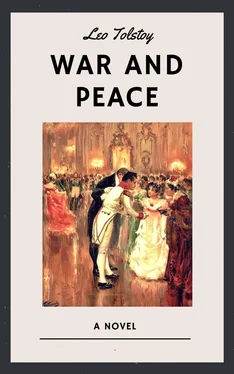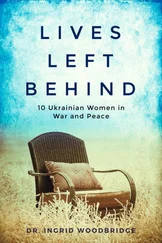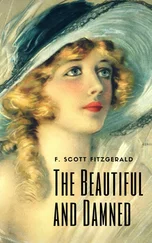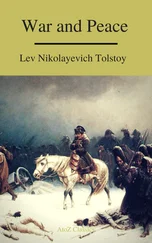The Cossacks sold the horse for two gold pieces, and Rostóv, being the richest of the officers now that he had received his money, bought it.
“But don’t hurt my little horse!” said the Alsatian good-naturedly to Rostóv when the animal was handed over to the hussar.
Rostóv smilingly reassured the dragoon and gave him money.
“Alley! Alley!” said the Cossack, touching the prisoner’s arm to make him go on.
“The Emperor! The Emperor!” was suddenly heard among the hussars.
All began to run and bustle, and Rostóv saw coming up the road behind him several riders with white plumes in their hats. In a moment everyone was in his place, waiting.
Rostóv did not know or remember how he ran to his place and mounted. Instantly his regret at not having been in action and his dejected mood amid people of whom he was weary had gone, instantly every thought of himself had vanished. He was filled with happiness at his nearness to the Emperor. He felt that this nearness by itself made up to him for the day he had lost. He was happy as a lover when the longed-for moment of meeting arrives. Not daring to look round and without looking round, he was ecstatically conscious of his approach. He felt it not only from the sound of the hoofs of the approaching cavalcade, but because as he drew near everything grew brighter, more joyful, more significant, and more festive around him. Nearer and nearer to Rostóv came that sun shedding beams of mild and majestic light around, and already he felt himself enveloped in those beams, he heard his voice, that kindly, calm, and majestic voice that was yet so simple! And as if in accord with Rostóv’s feeling, there was a deathly stillness amid which was heard the Emperor’s voice.
“The Pávlograd hussars?” he inquired.
“The reserves, sire!” replied a voice, a very human one compared to that which had said: “The Pávlograd hussars?”
The Emperor drew level with Rostóv and halted. Alexander’s face was even more beautiful than it had been three days before at the review. It shone with such gaiety and youth, such innocent youth, that it suggested the liveliness of a fourteen-year-old boy, and yet it was the face of the majestic Emperor. Casually, while surveying the squadron, the Emperor’s eyes met Rostóv’s and rested on them for not more than two seconds. Whether or no the Emperor understood what was going on in Rostóv’s soul (it seemed to Rostóv that he understood everything), at any rate his light-blue eyes gazed for about two seconds into Rostóv’s face. A gentle, mild light poured from them. Then all at once he raised his eyebrows, abruptly touched his horse with his left foot, and galloped on.
The younger Emperor could not restrain his wish to be present at the battle and, in spite of the remonstrances of his courtiers, at twelve o’clock left the third column with which he had been and galloped toward the vanguard. Before he came up with the hussars, several adjutants met him with news of the successful result of the action.
This battle, which consisted in the capture of a French squadron, was represented as a brilliant victory over the French, and so the Emperor and the whole army, especially while the smoke hung over the battlefield, believed that the French had been defeated and were retreating against their will. A few minutes after the Emperor had passed, the Pávlograd division was ordered to advance. In Wischau itself, a petty German town, Rostóv saw the Emperor again. In the market place, where there had been some rather heavy firing before the Emperor’s arrival, lay several killed and wounded soldiers whom there had not been time to move. The Emperor, surrounded by his suite of officers and courtiers, was riding a bobtailed chestnut mare, a different one from that which he had ridden at the review, and bending to one side he gracefully held a gold lorgnette to his eyes and looked at a soldier who lay prone, with blood on his uncovered head. The wounded soldier was so dirty, coarse, and revolting that his proximity to the Emperor shocked Rostóv. Rostóv saw how the Emperor’s rather round shoulders shuddered as if a cold shiver had run down them, how his left foot began convulsively tapping the horse’s side with the spur, and how the well-trained horse looked round unconcerned and did not stir. An adjutant, dismounting, lifted the soldier under the arms to place him on a stretcher that had been brought. The soldier groaned.
“Gently, gently! Can’t you do it more gently?” said the Emperor apparently suffering more than the dying soldier, and he rode away.
Rostóv saw tears filling the Emperor’s eyes and heard him, as he was riding away, say to Czartorýski: “What a terrible thing war is: what a terrible thing! Quelle terrible chose que la guerre! ”
The troops of the vanguard were stationed before Wischau, within sight of the enemy’s lines, which all day long had yielded ground to us at the least firing. The Emperor’s gratitude was announced to the vanguard, rewards were promised, and the men received a double ration of vodka. The campfires crackled and the soldiers’ songs resounded even more merrily than on the previous night. Denísov celebrated his promotion to the rank of major, and Rostóv, who had already drunk enough, at the end of the feast proposed the Emperor’s health. “Not ‘our Sovereign, the Emperor,’ as they say at official dinners,” said he, “but the health of our Sovereign, that good, enchanting, and great man! Let us drink to his health and to the certain defeat of the French!”
“If we fought before,” he said, “not letting the French pass, as at Schön Grabern, what shall we not do now when he is at the front? We will all die for him gladly! Is it not so, gentlemen? Perhaps I am not saying it right, I have drunk a good deal—but that is how I feel, and so do you too! To the health of Alexander the First! Hurrah!”
“Hurrah!” rang the enthusiastic voices of the officers.
And the old cavalry captain, Kírsten, shouted enthusiastically and no less sincerely than the twenty-year-old Rostóv.
When the officers had emptied and smashed their glasses, Kírsten filled others and, in shirt sleeves and breeches, went glass in hand to the soldiers’ bonfires and with his long gray mustache, his white chest showing under his open shirt, he stood in a majestic pose in the light of the campfire, waving his uplifted arm.
“Lads! here’s to our Sovereign, the Emperor, and victory over our enemies! Hurrah!” he exclaimed in his dashing, old, hussar’s baritone.
The hussars crowded round and responded heartily with loud shouts.
Late that night, when all had separated, Denísov with his short hand patted his favorite, Rostóv, on the shoulder.
“As there’s no one to fall in love with on campaign, he’s fallen in love with the Tsar,” he said.
“Denísov, don’t make fun of it!” cried Rostóv. “It is such a lofty, beautiful feeling, such a...”
“I believe it, I believe it, fwiend, and I share and appwove...”
“No, you don’t understand!”
And Rostóv got up and went wandering among the campfires, dreaming of what happiness it would be to die—not in saving the Emperor’s life (he did not even dare to dream of that), but simply to die before his eyes. He really was in love with the Tsar and the glory of the Russian arms and the hope of future triumph. And he was not the only man to experience that feeling during those memorable days preceding the battle of Austerlitz: nine tenths of the men in the Russian army were then in love, though less ecstatically, with their Tsar and the glory of the Russian arms.
The next day the Emperor stopped at Wischau, and Villier, his physician, was repeatedly summoned to see him. At headquarters and among the troops near by the news spread that the Emperor was unwell. He ate nothing and had slept badly that night, those around him reported. The cause of this indisposition was the strong impression made on his sensitive mind by the sight of the killed and wounded.
Читать дальше












